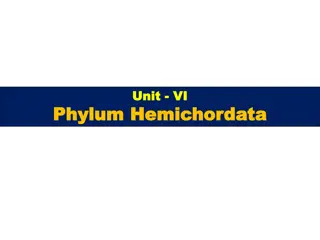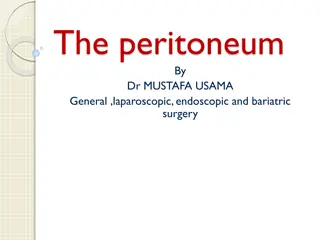External Morphology and Functions of Balanoglossus
Balanoglossus is an elongated, wormlike animal with a unique body structure divided into proboscis, collar, and trunk regions. The body wall consists of an outer epidermis, inner musculature, and peritoneum, providing protection and support. The proboscis is a club-shaped structure, the collar conta
0 views • 7 slides
Understanding the Peritoneum: Structure, Functions, and Inflammatory Responses
The peritoneum, a vital membrane in the body's abdominal cavity, consists of visceral and parietal components with distinct pain perceptions. It plays crucial roles in lubrication, fluid absorption, immune responses, and more. Peritoneal inflammatory exudate can result from various causes such as ba
0 views • 36 slides
Understanding Peritonitis: Causes, Symptoms, and Management
Peritonitis is inflammation of the peritoneum, often caused by bacterial infections or other factors like bile leaks or ruptured ectopic pregnancies. Recognizing the signs, such as sudden abdominal pain and tenderness, is crucial for early diagnosis and treatment. Effective management involves treat
0 views • 26 slides
Diagnostic Dilemma in a Case of Hemo-peritoneum in Obstetrics
A 25-year-old pregnant woman presented with a history of blunt trauma, diffuse pain, and urinary retention. Despite a normal initial ultrasound, she developed breathlessness and urinary issues. Clinical examination revealed significant pallor and diffuse abdominal tenderness. This case highlights th
0 views • 18 slides
Case Study: Recurrent Outflow Failure and Catheter Encapsulation in PD Patient
Case study of a 69-year-old patient with hypertensive nephrosclerosis experiencing recurrent outflow failure and encapsulation of a PD catheter. Initial difficulties with catheter placement led to multiple instances of pain on inflow/outflow, necessitating repositioning and replacement procedures. E
0 views • 10 slides
Understanding Peritoneum and Inguinal Canal in Anatomy
Peritoneum is a thin serous membrane covering the abdomen and pelvis, consisting of parietal and visceral layers with a peritoneal cavity between them. Learn about peritoneal relations, intraperitoneal versus retroperitoneal organs, and folds of peritoneum like ligaments and omenta in this detailed
0 views • 21 slides





